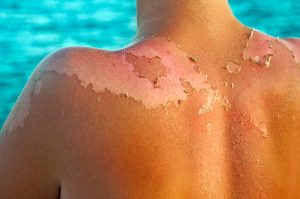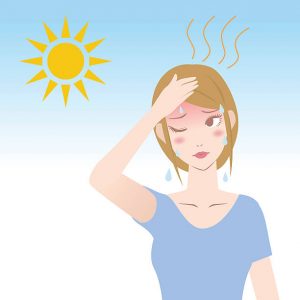During dry season, the sun is very hot with little to no rain. The little rain that falls during this period makes the weather hotter instead of keeping everywhere cool. This is happening because the ground absorbs heat from the sun as the sun shines, on receiving a cooling effect in the form of rain, the ground emits the heat it has stored up in it.
This weather takes a toll on us physically, mentally, emotionally, and physiologically. Excess exposure to the sun, especially when hot can be harmful to us.
Physical effect
The sun gives off ultraviolet (UV) rays that can help and harm us.
The skin is made up of the hypodermis, dermis, and epidermis. The epidermis (outer layer) contains a pigment known as melanin which is responsible for our skin color. Dark skinned people have more melanin than light skinned people. Melanin prevents UV rays from destroying our skin and creates vitamin D.
During defense against UV rays, the skin gets darker (also known as tanning). However, excess exposure to sunlight can lead to sunburn where UV rays penetrate the inner skin layers causing damage and destruction to skin cells.

Physical effect of sun exposure
Image credit: istock photos
The harmful effects of the sun physically include:
- Redness and hotness of the skin with change in original color, bumps, and dryness.
- Tight, itchy skin with pain and blisters.
- Dry patches of skin which eventually peels off.
Continuous exposure to harmful effects of the sun overtime can cause damage to vital organs exposed to the sun.
- Some skin cells with melanin can clump together forming freckles and moles.
- The skin degenerates fast leading to early aging. For example, wrinkled, leathery or tight skin with dark spots.
- Continuous exposure of the eyes to harmful sun rays can damage eye tissues (especially the cornea). This can blur your vision causing cataracts and if left untreated can cause blindness.
- Skin cancer (melanoma) and reduced immune system can also occur
The physical effect of harmful effects of the sun is seen in everyone. However, people with prolonged exposure to the sun; people with fair skin or moles; family history of skin cancer are more at risk
Mental and Emotional effect
Personally, I feel more stressed and tired when the sun is hot, accompanied with headache and teary eyes, when compared to a cool rainy day. Am I the only one who feels this way?
Our mental and emotional well-being are interconnected. Our emotions (positive or negative) can either give us good or poor mental health.

Image credit: istock photos
Heat makes us feel irritated; affects our sleep pattern causing us to have insufficient sleep and feel tired when we wake up; it takes up our motivation and zeal to carry out our daily tasks and challenges as they come.
A study found that during hot seasons, people are more stressed which increases the occurrence of risky behaviours; and have more negative emotions like anger than positive emotions like joy and contentment, as against cold seasons.
Also, people with mental disorders and people taking certain types of drugs like antidepressants are peculiarly more sensitive to sun and heat exposure. They may come down with heat stroke and heat exhaustion in areas of extreme heat.
Physiologic effect
The physiologic effect deals with how our body responds to heat from the sun. The longer you spend in the sun, the more serious the effects are.
Your body temperature increases which leads to profuse sweating, dehydration, tiredness, headache, clammy and dried skin, dizziness, and weakness.
A major concern in this aspect is dehydration and constipation
Image credit: istock photos
Dehydration is a concern because it is one of the major causes of every feeling you have when there is heat. It can lead to dizziness, headache, increased thirst, low urine output or dark colored urine and tiredness.
From experience, when I am dehydrated, I have constant raging headache that does not subside with the use of paracetamol. I wake up after a long sleep feel tired and worn-out.

Constipated man
Image credit: istock photos
Constipation occurs when you are not able to pass out stool freely as you usually do. People who are dehydrated suffer from constipation (as the body reabsorbs the fluid necessary for evacuation of the stool), and if not managed properly, can lead to pile or hemorrhoides.
COPING WITH SUN EXPOSURE
After knowing how exposure to the sun in form of intensity (heat) and radiation (UV rays), we need to find ways to cope with it as it is part of our lives.
- Knowing your body and how it reacts to the sun would give you an idea on how to prevent the harmful effects of sun exposure
- The use of sunscreen will protect you from UV rays. Sunscreen should be applied 30minutes before going outside; reapplied after every 2hours, sweating or swimming.

Image credit: pixabay
- The sun in the early hours of the day (before 10am) is beneficial to us. Avoid direct sun between 10am and 4pm, as this is when the sun rays are strongest and harmful.
- When going out when sun rays are high, use sunshades, umbrellas, and sunscreens to reduce direct exposure to sun.

Woman using sunscreen
- Wear light clothing and clothes that are breathable to avoid exhaustion from heat.
- Consult your doctor or pharmacist on the side effects of medicines you take that can make you sensitive to sun rays like antidepressants, some antibiotics and birth control pills.
- Pay attention to the way your mood, habits and attitude are affected by high temperatures from the sun.
Do you feel irritated, indifference or disinterested in your work or daily activities?
- Pay attention to whatever you feel about yourself, this will make you have more information and make conscious choices on your behaviour.

Image credit: istock photos
- Stay hydrated by drinking water consciously and regularly to prevent dehydration and distress.
This can influence our mood in a positive way as it helps the body cool down naturally.
- Eat fruits and vegetables that are high in fluids like watermelon and cucumber. They also help to keep you hydrated.
- Wear light clothing during the day and to sleep; and in cases of headache at bedtime, drink water and reduce screen lights of gadgets around you.
- Have a bath before going to sleep. This helps to keep you cool and also help you sleep well.
- Certain surfaces like concrete, sand and water absorb heat and radiation from the sun. As the sun goes down, these surfaces reflect heat and harmful rays, be sure to avoid such surfaces.
- Get involved in relevant physical activities that can help improve your mood and handle other emotional concerns.
Stay calm, treat others kindly, encourage other people around you to stay positive, hydrated and take appropriate measures to prevent stress associated with sun exposure.

Ezike Nonye is a Pharmacist who completed her Bachelor degree from University of Lagos (B.Pharm). She is currently exploring digital marketing analytics as a novel field in Pharmacy practice while also interning at the Federal Medical Center (FMC) Abeokuta, Ogun State, Nigeria. She is a graphic designer, a blogger and an entrepreneur. She is passionate about creating new things from nature and believes that there is no limitation to what you can achieve. She is a Christian and loves writing and open to new ideas and skills.


